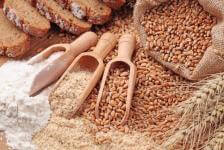Does Phytic Acid Increase Bone Loss?
Whole grains and legumes contain compounds called phytates that can interfere with calcium absorption. Does eating these foods increase your risk of osteoporosis?

Ironically, lots of people have begun soaking and sprouting their grains, beans, and nuts–or avoiding them altogether–to reduce the phytic acid content and enhance mineral absorption. But a recent study finds that women who have the most phytates circulating through their bodies actually have fewer factures and less bone loss over time. Far from increasing your risk, a phytate-rich diet may actually help protect against osteoporosis.
See also: Diet for Healthy Bones
How Do Phytate-Rich Foods Strengthen Bones?
It appears that when your diet is high in phytates, your body adjusts by decreasing the amount of calcium that gets excreted in the urine. In other words, your body conserves calcium to make up for reduced absorption from foods. Phytic acid also appears to block the formation of osteoclasts, which are cells that break down bone tissue. This, by the way, is exactly how osteoporosis drugs like Fosamax work.

